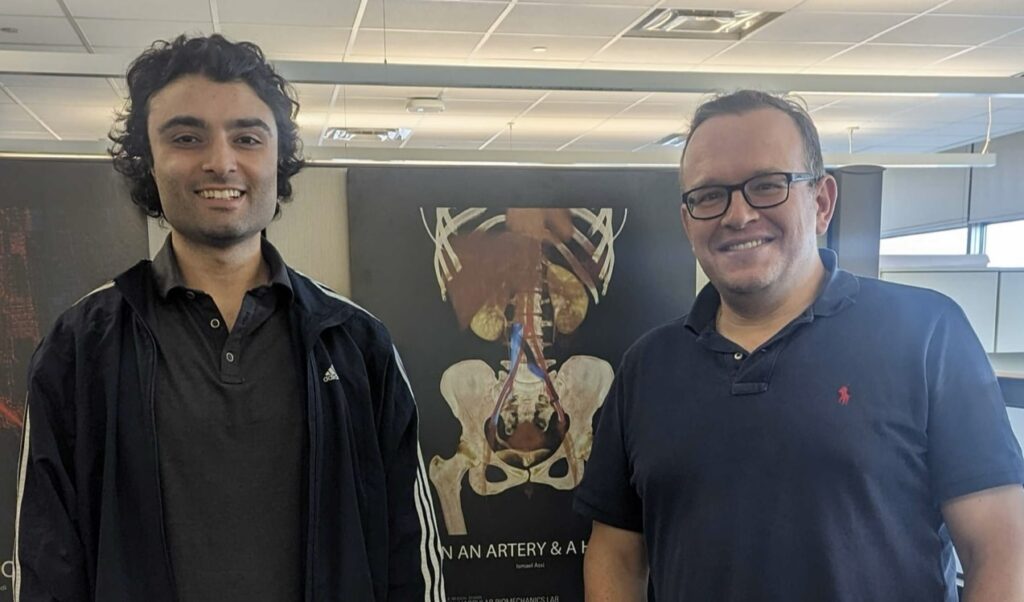Biomedical Engineering Undergraduate Major
Biomedical Engineering is the application of the life sciences and engineering principles to bridge the gap between medical technology and medicine in practice.
BME is solving important challenges at the intersection of engineering, medicine, and the life sciences for the benefit of humanity.
- BME Atlas Profile (current students only)
- Explore other majors
Why Biomedical Engineering at Michigan?
#8
Among BME graduate programs in the country
(2025 U.S. News & World Report)
Depth and breadth
U-M BME is the only joint department at Michigan shared between Michigan Medicine and Michigan Engineering. Students have the opportunity to work within the hospital and connect with clinical and engineering perspectives.
Unlimited possibilities
The Michigan BME undergraduate major provides a strong foundation in the life sciences and engineering, preparing students to work in the biomedical industry or transition into Medical school or graduate studies in BME through the Sequential Undergraduate/Graduate Studies (SUGS) program.
What our graduates do
Job titles
BME majors find positions such as Associate Researcher, Associate Scientist, Clinical Application Specialist, Design Engineer, Manufacturing Engineer, Patent Examiner, Process Engineer, Project Engineer, Quality Engineer, R&D Engineer, Research Support Engineer, Systems Engineer and myriad more!
Salary and job placement information (pdf)
Source: Michigan Engineering Career Resource Center
Academic tracks
Undergraduate Biomedical Engineering students can choose to complete their depth requirements in one of 9 biomedical engineering tracks.
Biocomputation
Emphasizes the creation and use of computational tools and data analysis methods to address complex challenges in biology and medicine.
Class: BIOMEDE 241. Statistics, Computation, and Data Analysis for Biomedical Engineers
Biomedical Imaging & Bioelectrics
Focuses on the development and implementation of imaging systems and electrical technologies to visualize and interact with biological tissues for both diagnosis and treatment
Class: BIOMEDE 442. Introduction to Biomedical Imaging
Biomechanics
Investigates how mechanical forces affect the body’s tissues and organs, providing insight for advances in medical devices, prosthetics, and movement analysis.
Class: BIOMEDE 231. Introduction to Biomechanics
Biotechnology & Pharmaceutical Engineering
Applies engineering principles to biological systems and processes, driving the discovery and production of pharmaceuticals, vaccines, and other biotechnological healthcare innovations.
Class: BIOMEDE 418. Quantitative Cell Biology
Medical Device Development
Involves the end-to-end process of inventing, designing, and testing new medical devices to improve clinical practice and patient care.
Class: BIOMEDE 458 (EECS 458). Biomedical Instrumentation and Design
Neural Engineering
Merges engineering, neuroscience, and technology to analyze, restore, or enhance the function of neural systems, aiming to solve neurological healthcare challenges.
Class: BIOMEDE 417 (EECS 417). Electrical Biophysics
Pre-Health
Equips students with a robust background in biomedical engineering, specifically designed for those intending to pursue advanced degrees in health professions.
Class: BIOMEDE 419. Quantitative Physiology
Systems Biology
Utilizes both laboratory experiments and computational modeling to unravel the complex interactions within biological systems and predict their behavior.
Class: BIOMEDE 211. Circuits and Systems for Biomedical Engineering.
Tissue Engineering & Regenerative Medicine
Integrates engineering and biological sciences to develop methods for repairing, regenerating, or replacing damaged or diseased tissues and organs.
Class: BIOMEDE 474. Introduction to Tissue Engineering
Minors
Engineering minors
Minors offered by departments in the College
Other minors
The full list of approved minors for engineers
Required courses
- Editable sample schedule (doc)
- BME Course Guide
- Atlas profile for BME (current students only)
- The Atlas profile includes the number of people in the program, how may semesters it typically takes to complete, common minors, courses at each level and more.
Contact an advisor
Email BME Advisors at [email protected] with questions. BME Academic Advising offers guidance and support for students to help them achieve their academic goals. The team’s goal is to ensure students stay on track for graduation and succeed in their studies.
Current Students:

Allie Tharp, Academic Advisor, Undergraduate Studies

Frankie Quasarano, Academic and Pre-Health Advisor, Undergraduate Studies
Prospective Students:
Engineering Advising Center and BME Peer Advisors
The Engineering Advising Center (EAC) provides academic services and support for first year and undeclared students. Services include academic advising, personal counseling, goal setting, and study strategies to facilitate your success. The professional staff and peer advisors work in a collaborative team to help you develop a plan to achieve your academic and personal goals. We provide direction and encouragement to explore options and make informed decisions. We’re here to help you get off to a strong start and make the most of your first year at Michigan.
BME Peer Advisors are able to help with 4-year planning, course scheduling, and overall interest in BME. High School students, UMich Engineering undeclared students, and UMich non-Engineering students are all welcome to meet with BME Peer Advisors.
You may use the Undergraduate Advising System to schedule an advising appointment with a peer advisor.
Accelerated master’s
Sequential Undergraduate-Graduate Studies (SUGS)
Complete your bachelor’s and master’s degrees in only five years with SUGS by taking some graduate-level classes during your undergraduate years, so you can save yourself one semester and complete the masters with only two additional semesters.
SEE: Biomedical Engineering Sequential Undergraduate Graduate Studies (SUGS)
Classroom Activities
Looking for something else?
- Experiential Learning – Michigan Engineering Immersed
- Admissions
- Declare a major
- University Financial Aid
- Engineering Career Resource Center


